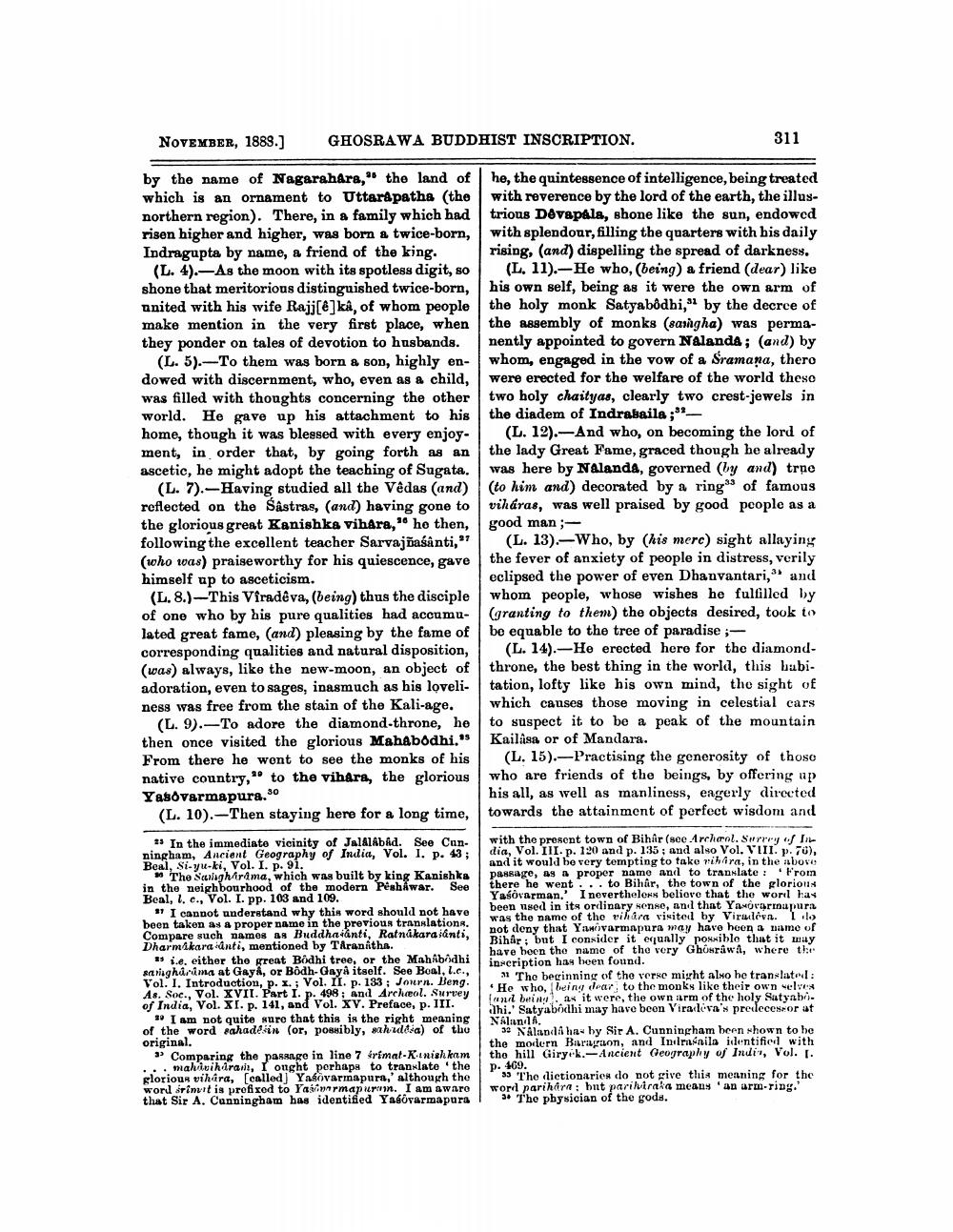________________
NOVEMBER, 1889.)
GHOSRAWA BUDDHIST INSCRIPTION.
311
by the name of NagarahAra," the land of he, the quintessence of intelligence, being treated which is an ornament to Uttarapatha (the with reverence by the lord of the earth, the illusnorthern region). There, in a family which had trious Dévapala, shone like the sun, endowed risen higher and higher, was born a twice-born, with splendour, filling the quarters with his daily Indragupta by name, a friend of the king. rising, (and) dispelling the spread of darkness.
(L. 4).-As the moon with its spotless digit, so (L, 11).-He who, (being) a friend (dear) like shone that meritorious distinguished twice-born, his own self, being as it were the own arm of united with his wife Rajj[@]kå, of whom people the holy monk Satyabodhi," by the decrce of make mention in the very first place, when the assembly of monks (saragha) was permathey ponder on tales of devotion to husbands. nently appointed to govern Nalanda; (and) by
(L. 5).--To them was born & son, highly en- whom, engaged in the vow of a Sramana, thero dowed with discernment, who, even as a child, were erected for the welfare of the world theo was filled with thoughts concerning the other two holy chaityas, clearly two crest-jewels in world. He gave up his attachment to his the diadem of Indrakaila;'?— home, though it was blessed with every enjoy- (L. 12).--And who, on becoming the lord of ment, in order that, by going forth as an the lady Great Fame, graced though he already ascetic, he might adopt the teaching of Sugata. was here by Nalanda, governed (by and) trpe
(L. 7).-Having studied all the Vedas (and) (to him and) decorated by a ring of famous reflected on the Sastras, (and) having gone to viháras, was well praised by good people as a the glorious great Kanishka vihara," he then, good man ;following the excellent teacher Sarvajñaśânti," (L. 13).-Who, by (his mere) sight allaying (who was) praiseworthy for his quiescence, gave the fever of anxiety of people in distress, verily himself up to asceticism.
eclipsed the power of even Dhanvantari," and (L. 8.)-This Viradêva, (being) thus the disciple whom people, whose wishes ho fulfilled by of one who by his pure qualities had accumu- (granting to them) the objects desired, took to lated great fame, (and) pleasing by the fame of be equable to the tree of paradise ; corresponding qualities and natural disposition, (L. 14).-He erected here for the diamond(was) always, like the new-moon, an object of throne, the best thing in the world, this bubi. adoration, even to sages, inasmuch as his loveli- tation, lofty like his own mind, tho sight of ness was free from the stain of the Kali-age, which causes those moving in celestial cars
(L. 9).-To adore the diamond-throne, he to suspect it to be a peak of the mountain then once visited the glorious Mahabodhi." Kailasa or of Mandara. From there he wont to see the monks of his (L. 15).-Practising the generosity of those native country," to the vihara, the glorious who are friends of the beings, by offering up Yasovarmapura."
his all, as well as manliness, eagerly directed (L. 10).-Then staying here for a long time, towards the attainment of perfect wisdom and
15 In the immediate vicinity of Jalalabad. See Can. ningham, Ancient Geography of India, Vol. I. p. 43; Beal, Si-yu-ki, Vol. I. p. 91.
The Sagharama, which was built by king Kanishka in the neighbourhood of the modern Peshawar. See Beal, l. e., Vol. I. pp. 103 and 109.
"I cannot understand why this word should not have been taken as a proper name in the previous translations. Compare such names as Buddhaianti, Ratnikara janti, Dharmikaranti, mentioned by Taranátha.
i.e. either the great Bôdhi tree, or the MahAbidhi en riagharima at Gay, or Bôdh-Gayà itself. See Boal, L.c. Vol. 1. Introduction, p. I.; Vol. II. p. 133; Journ. Beng. As. Soc., Vol. XVII. Part I. p. 498; and Archeol. Survey of India, Vol. XI. p. 141, and Vol. XV. Preface, p. III.
* I am not quite sure that this is the right meaning of the word rahade in (or, possibly, sah iddia) of the original
» Comparing the pasage in line 7 4rimal-Renish kam ... mahiiharait, I onght perhaps to translate the
an late 'the glorious vihara, [called) Yasovarmapura,' although the word drinvit is prefixod to Yarmapur. I am aware that Sir A. Canningham has identified Yabōvarmapura
with the present town of Bihar (see Archeol. Sorry. I dia, Vol. III. p. 120 and p. 135; and also Vol. VIII. p. 70), and it would be very tempting to take rihara, in the above passage, a proper name and to translate: From there he went ... to Bihar, the town of the glorious Yasovarman,' I nevertheless believe that the worl has been used in its ordinary sense, anil that Yavorarmupura was the name of the vihare visited by Viren. 1.l. not deny that Yai varmapura may have heen a name of Bihar : but I consider it equally possible that it may have been the name of the very Ghüsrawa, where the inscription has been found.
The beginning of the verse might also he translate: He who, being dear, to the monks like their own selv aanut being as it were, the own arm of the holy Satynbri. ühi. Satyabodhi may have been Viralera's predecesor ut NÁland.
32 Nálunha by Sir A. Cunningham been shown to be the modern Baragraon, and InIrisnila identified with the hill Giryek.--Ancient Geography of Indir, Vol. 1. p. 469.
9 The dictionarios do not give this meaning for the word parihar: but parihiraka means an urm-ring.
» The physician of the gods.




